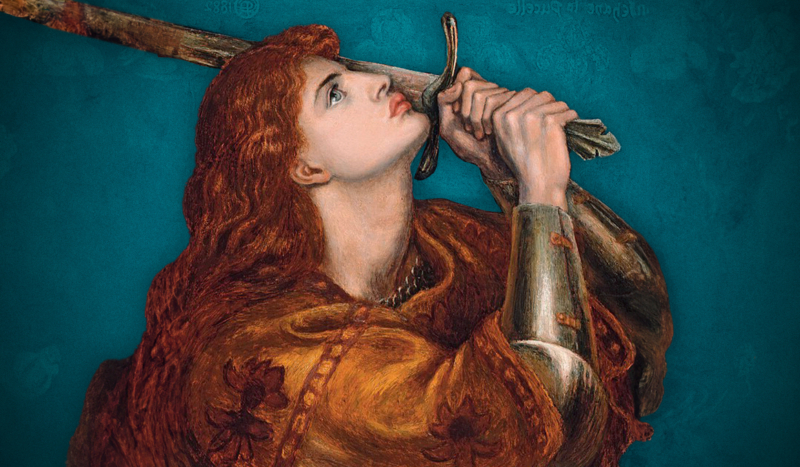
On May 30 the Catholic Church venerates the life of St. Joan of Arc, patroness of France. This lightning rod of a saint was known for her fearlessness, unconventionality, and immovable faith.
Here are five interesting facts about the Angel of France.
St. Joan Frequently Had Visions
Born Jeanne D’Arc on January 6, 1412, Joan grew up in a divided France and at 13 experienced her first vision.
Joan claimed that she frequently heard the voices of St. Michael, St. Catherine, and St. Margaret. The saints, she said, were asking her to help drive the English from the French territory and help crown the Dauphin Charles VII at Reims.
Fulfilling Prophecy and Military Conquests
With no military training, a fearless Joan succeeded in presenting herself before the Dauphin and ultimately gained his trust when it came to strategy in the Lancastrian War.
During this time, there was a local prophecy that a virgin would restore France, and there was an ongoing conflict in Orleans. Joan of Arc reached Orleans in full armor and claimed God sanctioned her presence.
The French lifted the five-month Siege of Orleans only nine days after Joan’s arrival, fulfilling the local prophecy in the process.
Her Clothing
Contrary to modern interpretations, St. Joan of Arc chose short hair and masculine dress for their practicality and to protect her purity. Such cross-dressing was later used as a basis for charges of heresy and even witchcraft.
When asked about her clothing during her trial, Joan stated that her masculine dress was for practical reasons, for protection against sexual assault, and to maintain her purity.
Court officials and witnesses at her trial noted that Joan had often appeared in women’s dress at court.
During her trial, Joan of Arc signed a document saying that she would renounce wearing men’s clothes and she was released back into prison.
Within days, however, her jailers stole her clothes and forced her to put man’s clothing on, a deception which ultimately led to her death.
She Was Eloquent and Intelligent
St. Joan of Arc was noted for giving sound advice on multiple occasions during her life.
Her eloquence was also noted during her interrogation and trial. During her trial, one of the inquisitors attempted to trap her and cause her to admit heresy.
He asked Joan if she was “in God’s grace.” An answer either way could prove to be an example of heresy or an admission of guilt.
The saint responded, “If I am not, may God put me there; and if I am, may God so keep me.”
She Died as a Result of a Corrupt Court
After turning the tide of the war in favor of France, the Frenchwoman was captured and sold to the English by the Burgundians.
The English court was intent on discrediting the French’s position and strengthening the English claim to the rights of lands held by the English in French territory. Labelling Joan of Arc as a heretic was seen as a way of delegitimizing the power and position of the French and the recently crowned Charles VII.
Ultimately, her death was seen as martyrdom and highlighted her heroic virtue in the face of corruption.
Check Out Our Joan of Arc Merch!

